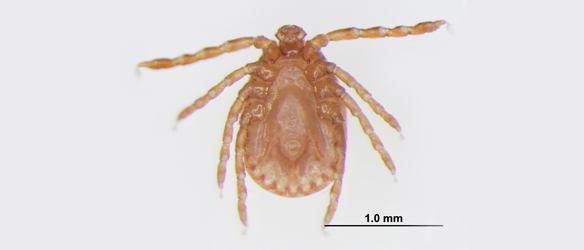How can we protect patients against the invasive longhorned tick?
A species of tick native to eastern Asia has been spreading in the United States, prompting concerns among veterinarians because there are no antiparasitic products approved in the United States for use against it. The AVMA has consulted with the FDA Center for Veterinary Medicine and determined that application of the regulations around extra-label drug use is an option to manage this parasite.

Also known as the longhorned tick or bush tick, Haemaphysalis longicornis is native to Japan, China and the Korean Peninsula, and has now been identified in several Mid-Atlantic states, as well as Arkansas. It was first identified in the United States last September in New Jersey and has since spread – quickly – to several other states. The rapid spread is due to the tick’s rare ability to reproduce asexually, with eggs hatching within six months rather than the two years that is typical for most other common tick species.
As the tick’s prevalence increases, food animal and companion animal practitioners have considered what options might be available to protect patients. There are no antiparasitic products available in the United States that contain a label claim against this species because pharmaceutical companies can’t establish the efficacy of an external parasite without an endemic parasite population against which products can be tested.
Fortunately, there are several products approved for use in the United States against similar parasites that also are approved in other geographic locations where they do have a label indication for Haemaphysalis longicornis. These are external parasite products within the classes of isoxazolines and macrocyclic lactones.
Practitioners and animal owners should be mindful that the use of drug products that aren’t labeled in the United States for this tick species would constitute an extra-label use. Any extra-label use, even of approved drugs, must be done under veterinary oversight and in accordance with the Animal Medicinal Drug Use Clarification Act of 1994 (AMDUCA) and extra-label use regulations. While the guidelines on extra-label drug use (ELDU) do not pertain to antiparasitic products that are classified as pesticides and regulated by the U.S. Environmental Protection Agency, they do apply to antiparasitic pharmaceuticals within the classes of isoxazolines and macrocyclic lactones. The AVMA continues to explore options veterinarians can exercise in controlling for these parasites.
The AVMA recognizes the importance of sound, science-based principles in developing and implementing external parasite prevention programs, and we encourage veterinarians to learn how you can contribute to the public health efforts of local tick control and surveillance programs in your area. We also provide materials to help you remind clients about the importance of parasite prevention:



Comments
Add New Comment